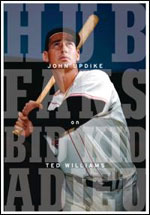
Hub Fans Bid Kid Adieu is a transcendent tribute to baseball and one of its most vivid and accomplished figures, as captured by one of America’s most legendary authors. As the author expresses it in tribute to the athlete, that truly “crowds the throat with joy” … and fills the heart and brings tears to the eyes, to boot.
On September 28, 1960, a young man in the early days of his life’s work – 28-year-old writer John Updike – attended the last appearance of another comparatively young man – 42-year-old all-star baseball player Ted Williams – at the end of what was truly his life’s work. Updike’s glowing fan’s notes were composed and edited over five days and published for the first time in the October 20, 1960 issue of The New Yorker. The original piece resurfaced in other Updike collections, as did a separate essay on the life of Ted Williams. The first bit of luminous reportage was finally joined with an updated version of the Ted Williams essay in a small, crisp volume published in 2010, touchingly prepared and additionally annotated by Updike just months before his death.
Hub Fans Bid Kid Adieu is consummate sport literature and, in its way, epic poetry. The wordcraft is positively crystalline, with both an intimacy of physical detail and a grand scale of historical and collective emotional sweep to it that is difficult to isolate to just one perfect example. There are many. Here is one, as Williams steps to the plate for the last time:
I had never before heard pure applause in a ballpark. No calling, no whistling, just an ocean of handclaps, minute after minute, burst after burst, crowding and running together in continuous succession like the pushes of surf at the end of the sand.
Presaging Williams’ storybook departure from the game, Updike also gorgeously captures the eternal dream of every team, every athlete, every fan who commits and cheers them on:
Nevertheless, there will always lurk, around the corner in a pocket of our knowledge of the odds, an indefensible hope, and this was one of the times, which you now and then find in sports, when a density of expectation hangs in the air and plucks an event out of the future.
Some of the beauty of Updike’s prose is when it is at its most succinct – when an unbelievable play is still in motion …
It was in the books while it was still in the sky.
… and when a recalcitrant hero refuses to respond to his deliriously happy fans:
Gods do not answer letters.
There is only one off note in this exquisite tribute. It is neither a false note in Updike’s words, nor anything that Williams did or said in his lifetime that unduly tarnished his legend, but just a peculiar footnote to the Williams afterlife (perhaps literally) that is, well, just odd. Beyond that, this is sport literature and literature beyond classification or genre at its most poignant and very finest.
